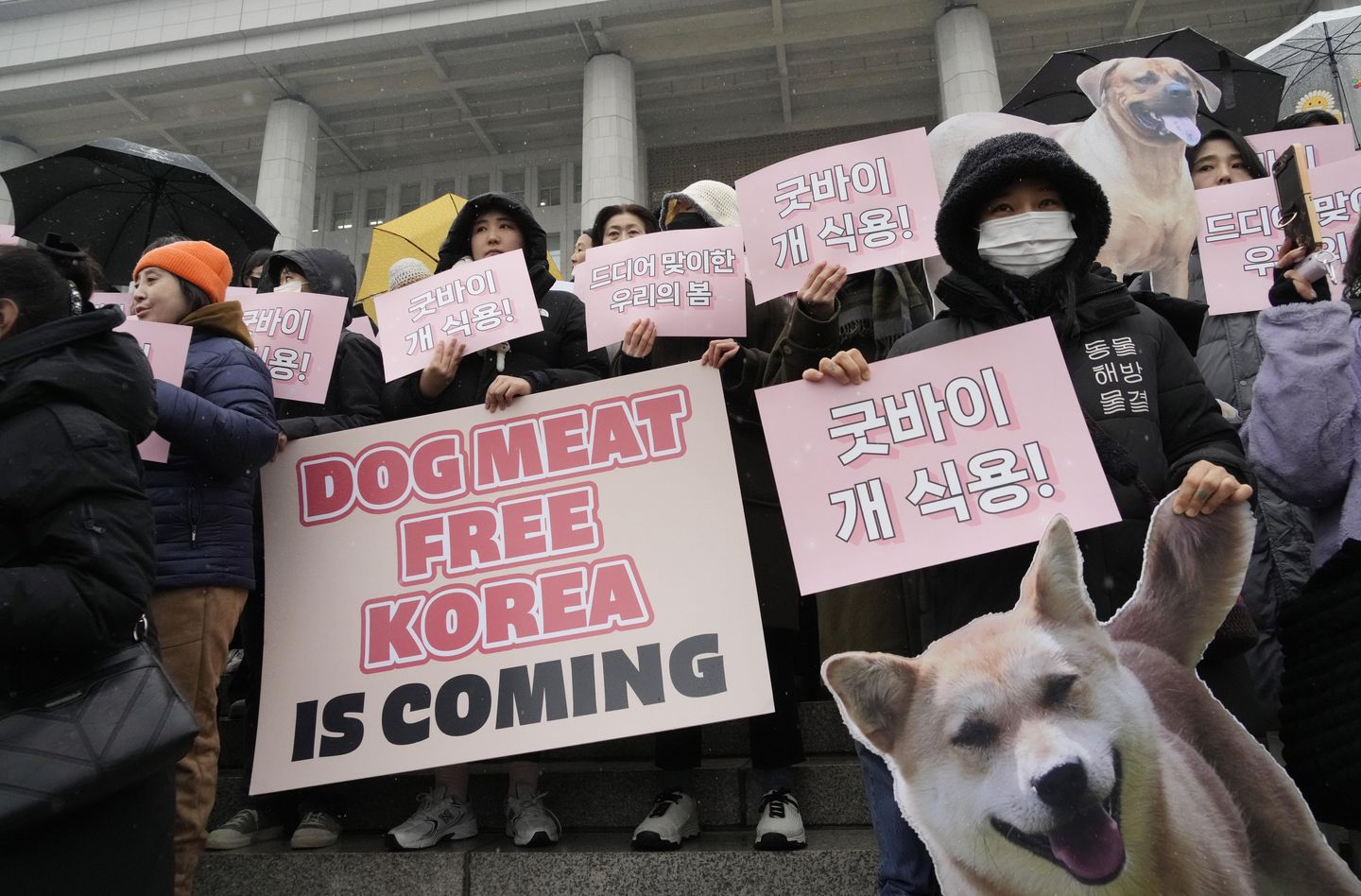
SEOUL, South Korea — Seventy-five years of division have led the two Koreas to adopt diametrically opposed policies on the peninsula’s most notorious culinary item.
Pyongyang last week proclaimed the benefits of eating dog meat during “Bok Nal,” the height of the steamy Korean summer, while Seoul is engaged in a three-year nationwide campaign to eradicate the farming and eating of canines.
Animal lovers may hail Seoul’s policy to end the consumption of man’s best friend, but at its heart lies a sad irony.
“Hundreds of thousands of dogs remain trapped in the industry,” Lee Sang-kyung, campaign manager at NGO Humane World for Animals Korea, told foreign reporters in Seoul on Thursday. “Rescuing every single dog is unfortunately not realistic.”
Due to shortages of animal shelter capacity and a low national rate of adoption of farmed dogs, the ending of the trade looks set to end the lives of all but a tiny percentage of some 460,000 dogs that make up the current market.
From food to pets
While Americans prepared to celebrate Independence Day, a national dog-meat cooking contest took place in North Korea’s capital.
According to state TV, monitored by South Korea’s Yonhap News Agency, 200 chefs gathered in the competition to produce the most delicious “sweet meat soup.” The soup, with canine meat as its key ingredient, was promoted as a healthy energy source in sweltering heat.
That belief has been deeply entrenched in Korea — for millennia, a grain-agricultural society in which peasants had minimal access to rich protein sources. It retains force in the North, which has a history of murderous famines and widespread malnutrition, but is crumbling in the well-to-do South.
South Korea’s ascent from economic backwater in the 1960s to industrial powerhouse in the 1980s saw its economy become deeply embedded in global trade, while citizens gained exposure to global norms.
Malnutrition evaporated as newly prosperous South Koreans gained access to chicken, pork and beef. Subsequently, ever-improving lifestyles turned middle-class South Korea into a pet-owning society.
Meanwhile, overseas references to dog consumption — campaigns by French actress Brigitte Bardot, jokes by talk show host Jay Leno, even mocking chants by English soccer fans — generated anger and embarrassment.
The consumption of dog meat — commonly served in a thick, sesame-and-pepper flavored stew known as boshintang — gradually dropped: A 2023 survey by HWAK (formerly Humane Society International) found 85% of Koreans had not dined on dog.
Amid animal cruelty concerns, dog meat came under social pressure. In January 2024, a bipartisan bill to end the farming, trade and consumption of dogs passed the National Assembly. Full implementation is set for February 2027.
Moral policy, brutal reality
The transition has not been easy for dog farmers, who have told media that it is becoming impossible to find buyers for their livestock in a collapsing market.
Even so, government policy and interested non-governmental organizations offer dog farmers support to transition out of the sector. What is missing are provisions for the dogs.
“That’s the most challenging question,” said Mr. Lee of HWAK, whose activities include underground operations to rescue abused dogs from farm cages and overground public awareness campaigns.
The group has relocated 2,800 farmed dogs, mainly to a shelter it operates in the U.S. that finds homes in the U.S., Canada and the U.K. Since the 2024 policy took effect, HWAK has rescued 68 canines.
Mr. Lee noted the delight of traumatized dogs being offered toys and treats for the first time in their lives.
Those happy outcomes, however, are a drop in the ocean. 2024 government research estimated the number of farmed dogs at 460,000.
“We can see in the government implementation plan a plan for the management and care of remaining dogs: Those dogs will be sent to government or private shelters,” Mr. Lee said. “But we all know that shelters are already overwhelmed, so when removed from farms, it is likely those dogs will be euthanized.”
Shelter operators face wrenching choices.
Laws provide for the euthanization of dogs not adopted within 14 days, Mr. Lee said, though he credited staffers for keeping dogs alive as long as possible.
Shelter adoptions are rare.
“Government research last year found that only 13% [of Korean dog owners] adopted dogs from shelters,” Mr. Lee said. “The rest bought them, or got them from friends.”
Even so, he broadly supports the 2024 policy: Euthanization by a trained vet is a kinder departure for a dog than death by electrocution, a method commonly used on farms, he explained.
The numbers present those putting the animals to sleep — however humanely — with a nightmarish mission. “It can be a trauma for the vets,” he fretted. “It’s a very difficult situation.”
There are other ironies.
Insisting that pets and livestock dogs are different breeds, and stating that the meat has medicinal benefits for those suffering stomach ailments, a middle-aged woman, speaking anonymously, lamented that due to social pressures, “These days, I can’t eat dog!”
“This campaign is the right way,” she conceded but asked in a nation where barbecued pork and beef are popular dinner options, “Why dogs? Why not all animals?”












